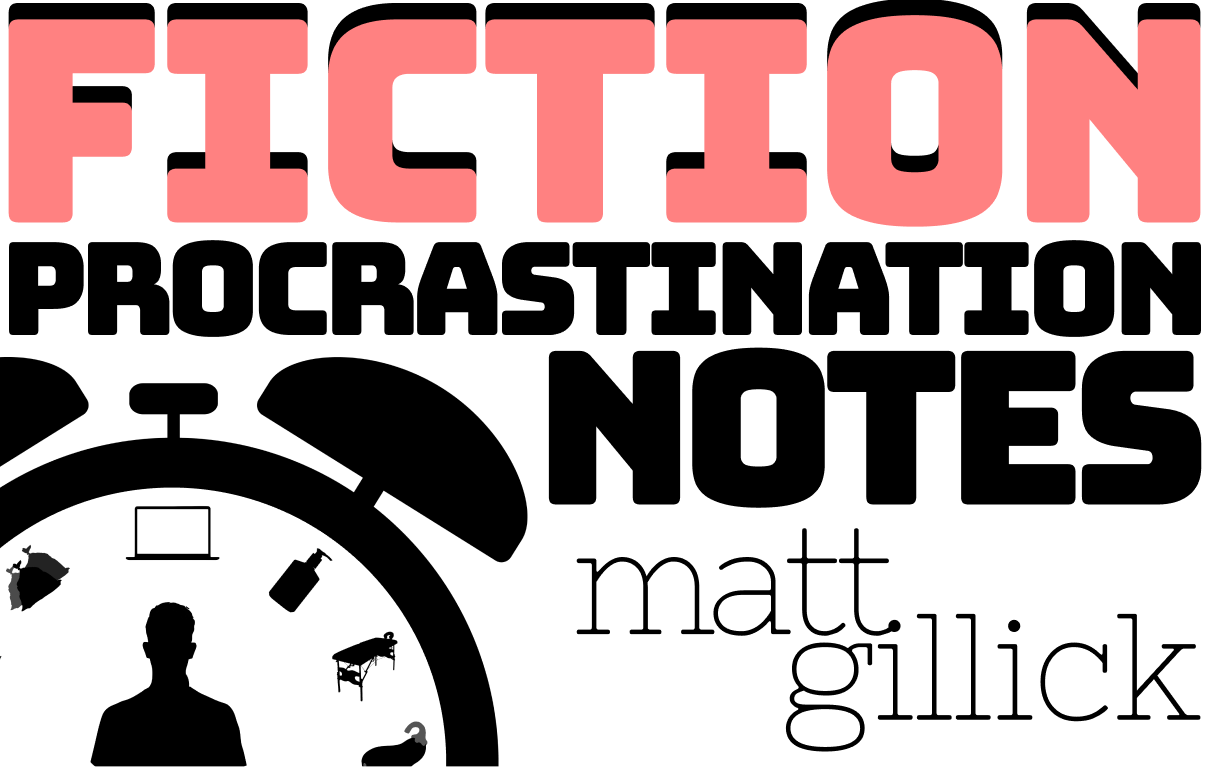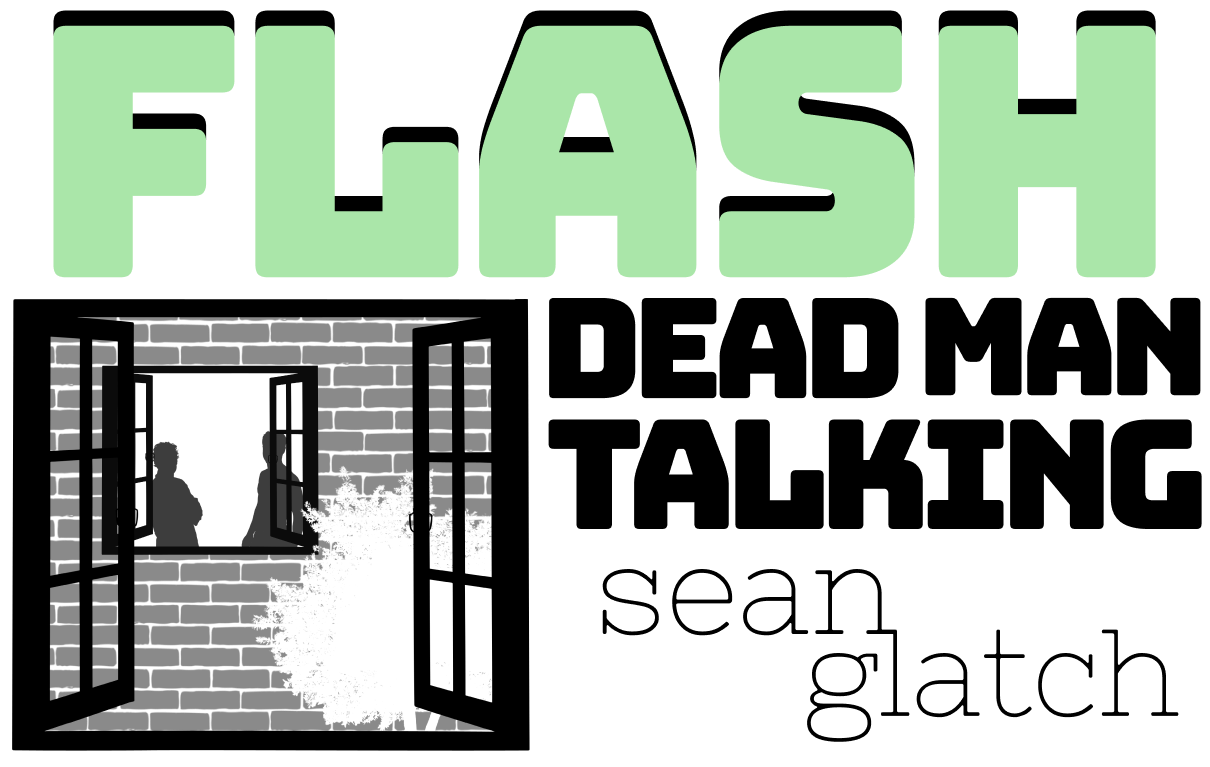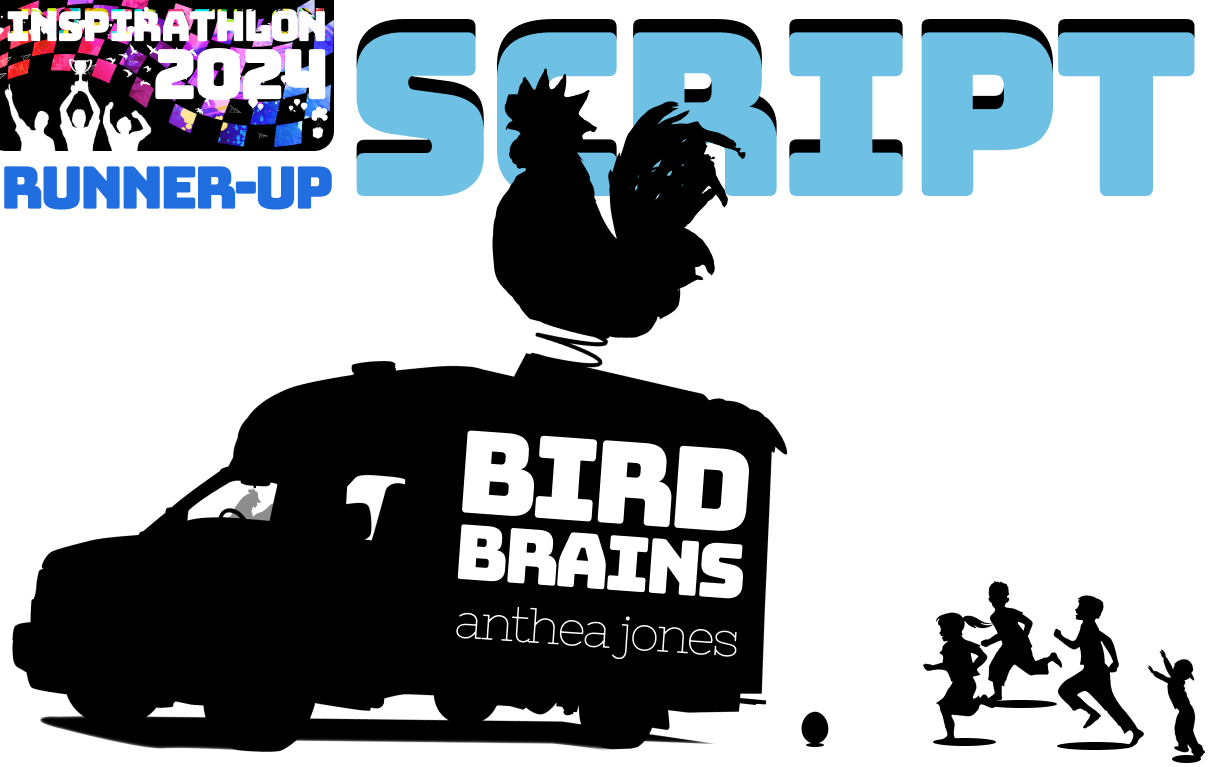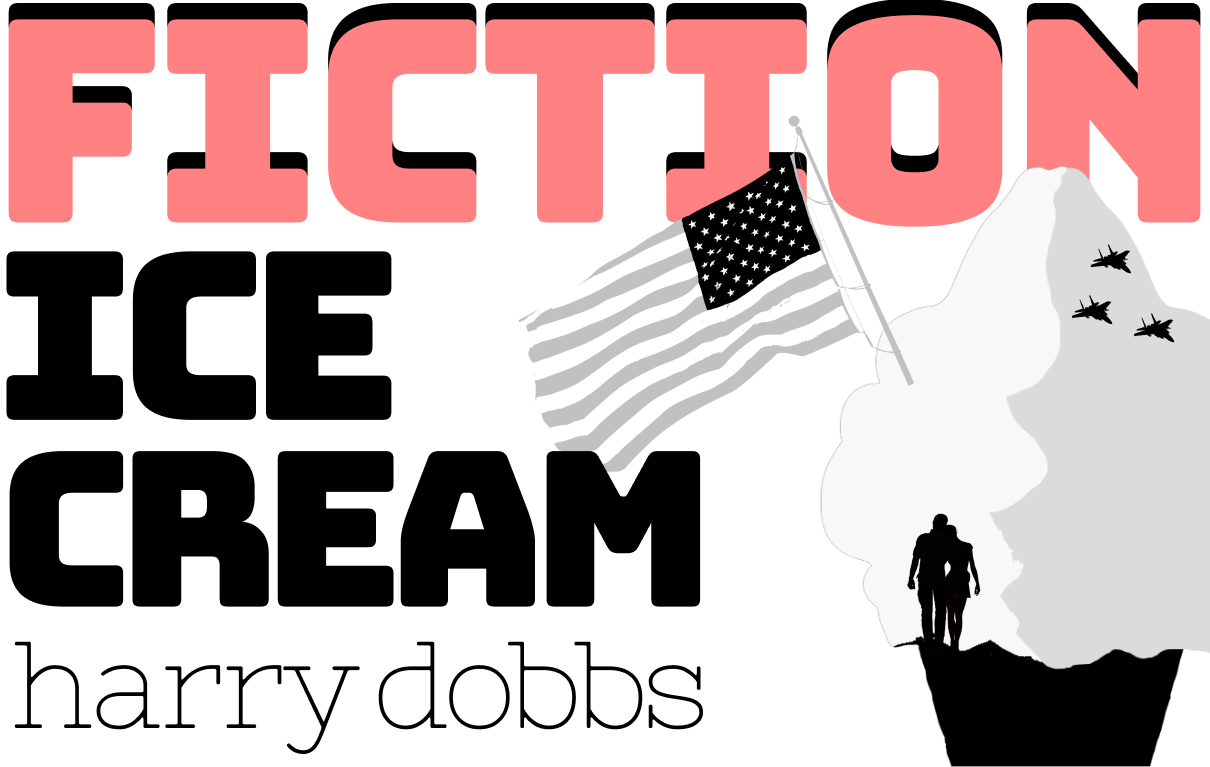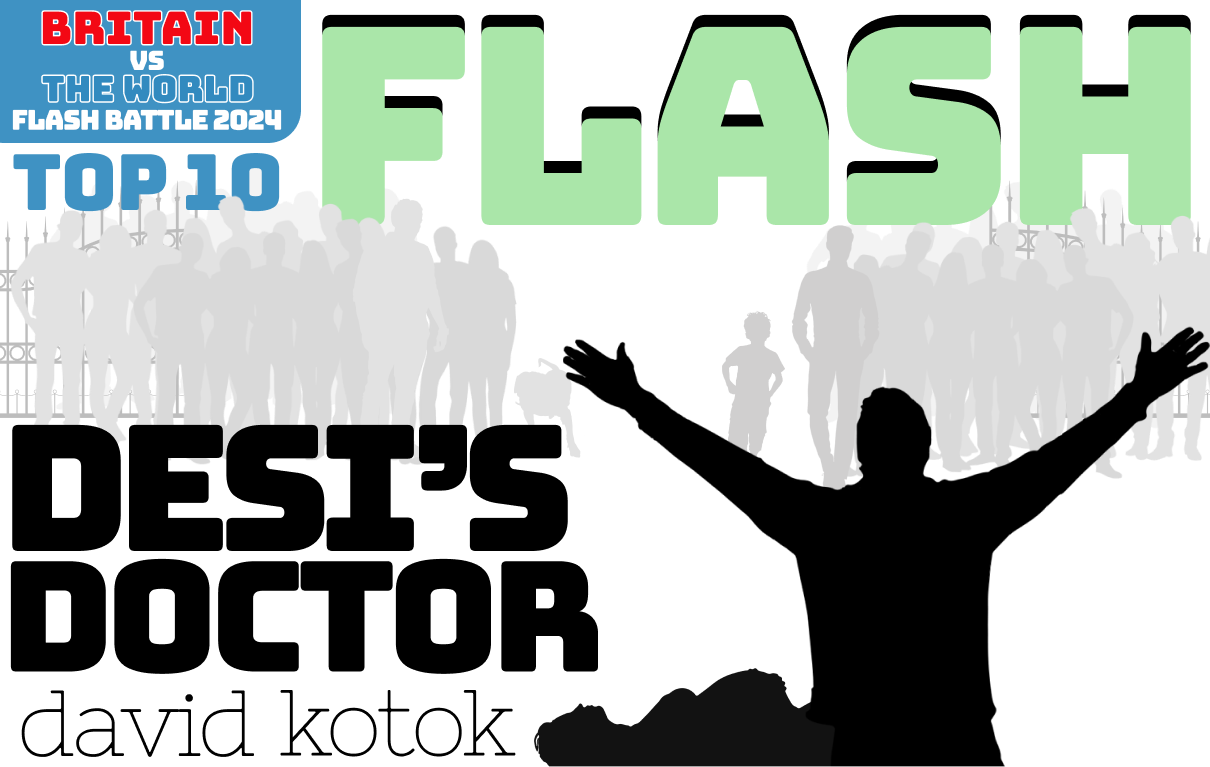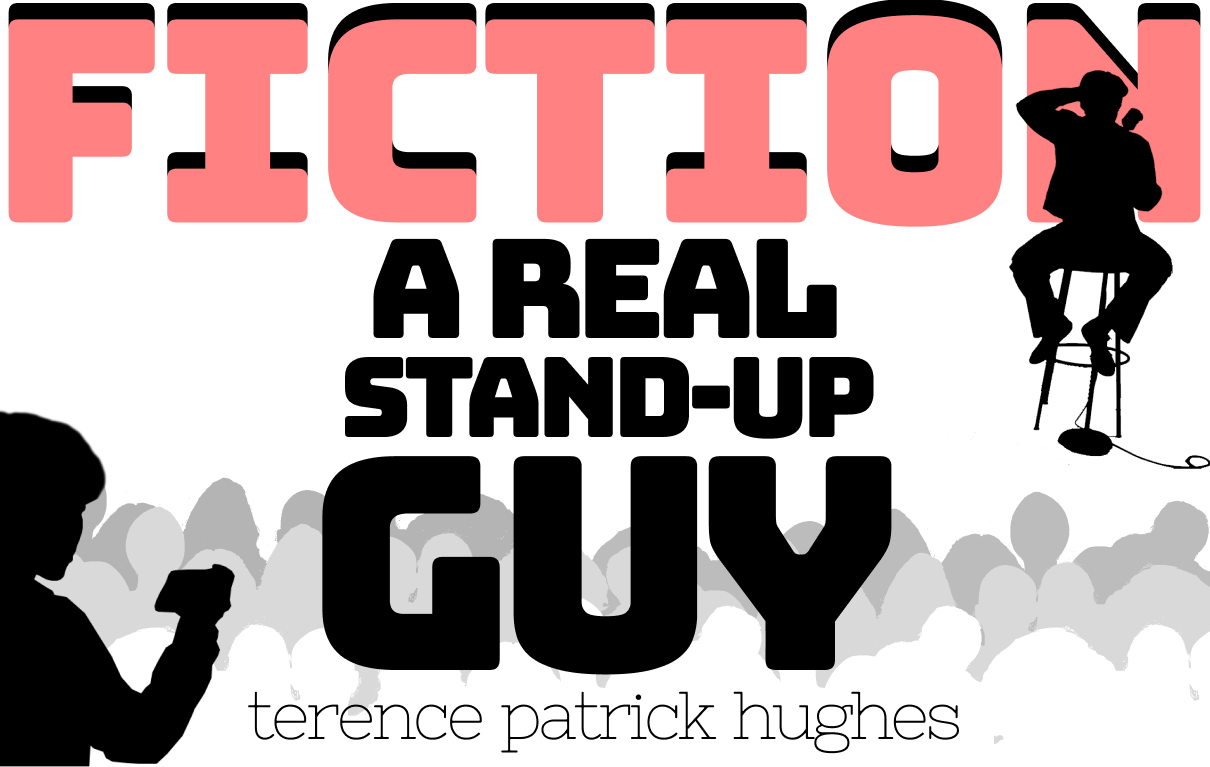
A Real Stand-Up Guy
The green room at LMAO is not really a room at all. It’s a 10 x 20 foot space sectioned off from backstage by musty drapery that often overlaps, making entry or escape a difficult endeavor. Yet, in either witty taste or cheapskate irony, the curtains are all green. At one end of this quasi-room is an old table upon which stand a half dozen plastic bottles of water, a box of snack-sized chips and a camping lamp. At the other, more shadowy side are six metal folding chairs, two of them presently occupied by the comic who had just come off stage after a bad set and the night’s headliner, Tony Starch. Tony had recently been on the Tonight Show but was currently practicing psychology.
“You gotta go in for the kill, kid,” he preached to the poor guy. “You play around with ‘em too much. Next time just knock their lights out.”
Tony looked at me after delivering his sage advice and rolled his eyes. I was pacing in the small no man’s land between the chairs and the potato chip buffet, and listening to the comic, Abby, onstage. At first, I wasn’t thrilled with how many laughs she was getting but then some collective groans and boos began to surface. To put off thinking about going on next, I decided to save the kid from Tony’s fake pity, grabbing a water off the table and walking it over to them.
“Here, pal,” I said, handing the bottle to the young comic. “Tough crowd, eh?”
“They were like the undead.” He quickly twisted off the top, gasping between sips. “What is it, ‘zombies drink free’ night?”
Tony stood up, gave a pat to the kid’s shoulder and then got on his phone, mumbling and snickering with someone he called ‘babe’. I envy him. No. I hate him with professional lust. We had shared bills for years together, first in downtown cellars and then in some fairly comfy uptown spots, but we’d never been more than ‘hey how are ya’ acquaintances. He was hyper-competitive back then, and now he’s just sort of a laid-back asshole with a TV pilot in development and better clothes than any of us.
“Hey,” I said to the young guy after he ripped a bag of chips open from the wrong end, “don’t listen to him.”
“Why?” he mumbled, munching and nodding toward Tony. “The guy’s making it.”
“With his stuff. You stick to your stuff. Forget about the killing. You just got to get them on your side.”
“How?”
That’s the holy grail question of comedy, and before I could begin to guess at an answer, the audience gave a soft round of applause with a generous side of catcalls as a wild fumbling of the curtains began. Finally, Abbie peeked her big blue eyes and mass of blond hair into the green room.
“Screw me sideways!” she bared clenched teeth “That crowd belongs in a church.”
“Good luck,” the kid said to me, and I knew he meant it.
Tony was still on the phone and ignoring us. As I passed Abbie, she touched my arm.
“Just yell ‘fire!’ and get out,” she advised with rattled sincerity.
After struggling through the drapery, I let my eyes adjust to the rest of backstage lit by a single red bulb near the fire exit, making the many stacks of junk look like prop pieces for a musical review in hell. Onstage, the emcee, Friar Humboldt, was tossing a couple of his own stale one-liners to the audience whose downcast faces were bathed eerily in the glow of cell phones. Humboldt, who runs comedy clubs in small theatres and bars around the city, comes from an old textile family that manufactured enough money back in the day to allow the fortune’s sole heir to embark on countless uncharted voyages as a mediocre producer. First, it was bad house music; next, a weird TV pilot about a man who thinks he’s a cat; then a long tumble backwards into pornography before washing ashore onto the beach of stand-up comedy. Still, for the comics it’s nice work if you can get it: two-fifty for twenty-five minutes, always cash. Who could ask for anything more?
Me. Certainly, me.
“Next up”—Humboldt’s voice rose to a carnival barker’s pitch—“a favorite of mine who’s suddenly everywhere these days. Let me tell you, sometime soon this guy’s gonna be a star…and by that I mean a very distant speck in the dark void of night. Here he is…Theodore Hawkes!”
Suddenly, it was that moment. No matter the stage, no matter the town, when I hear my name before a set, it takes me so near to that state of warm pleasure as a kid when my dad called me to supper or my mom playfully admonished my slightly off-color knock-knock jokes: magic moments gone way too soon.
“Get the hell out there, you moron!” Humboldt pulled hard at my jacket sleeve.
“‘A speck in the dark void of night’? Who are you, Edgar Allen Poe?”
“You’ll be Edgar Allen Poor if you don’t get moving.”
I smiled and straightened his tie for him: my way of losing gracefully. As I stepped onstage, a couple of people clapped but otherwise it was silent except the murmur of a few patrons around the tables, and the mixing of drinks at the bar in the back of the room.
“Hey, there,” I cooed, once I’d reached the mic. “From backstage, it sounds like an all-you-can-eat buffet of comedians out here. Well, rest assured, I’m quite nutritious. I was born and raised in a cage free home…except for that one time in high school with my girlfriend and a portable kennel.”
A couple of laughs, nothing too encouraging. Uptown, they’re usually a smart crowd, but the show started late, and now they’re a smart and drunk audience, a delicate munition to detonate.
“So I got divorced this year. Any divorcees out there? OK, wow, that’s a large number. Gentleman, my condolences, and ladies, my apologies, because that was my pick-up line. I’ll see you all after the show.”
Some OK chuckles, and a few brief, lovely titters.
“My wife and I are actually nearing the end of a painful divorce. There was an ugly custody battle. I battled her lawyer one night and wound up in custody.
“But it’s not so bad, divorce. They say it’s the other side of marriage. Like some Zen anti-depressant bullshit bumper sticker. But it’s demonized, isn’t it? Marriage is shouted from the rooftops! ‘Did you hear your cousin Catherine got married!!’ But divorce. It’s talked about in whispers like a sexual organ rash…which, by the way, is the reason for over a quarter of all separations.”
They weren’t rolling in the aisles but at least most of the phones were shut off. Though there was a group with two tables pushed together in the back, urban types, youngish, smartly coiffed, and not entirely paying attention to me.
“So my wife had all the money, which means that now I’m broke. Which is an apt expression because I never did work correctly. I lie, I cheat and I screw up everything. I’m essentially unemployable outside of politics.
“I had to find a place to live. My new apartment is in a recently un-gentrified neighborhood. I compete for parking spots with drug dealers and pimps. They win. I don’t know why I drive in the city. For the amount of money I pay for parking, I could afford to get robbed six to seven times a month on the subway.”
My spoiled city kids had joined in the amusement, looking to each other for approval and then sharing a steady giggle.
“Anyone in here ever been robbed? I’m sorry guys, you can’t count divorce as robbery even if it checks all the boxes. I got held up at gunpoint a couple of months ago. Guy took my wallet and immediately used my bank card for a thousand dollars at bodegas, bars and strip clubs across the city. What’s worse is I couldn’t prove any of it because they are the exact charges that I’ve been racking up since the divorce. Which brings us back to the prickly issue of the sexual organ rash.”
I’m not a physical comedian. I dress slightly above average – sports coat, dark jeans – and for the most part I aim to be, if not intelligent in my humor, then at least community college bright. It requires cerebral effort and very little clowning, but after the sneaky return to the rash of intimate nature, I reach down and tug a couple of slight itches to my crotch and the crowd scratch with me. The couples executing clumsy dates up front, older folks in the middle at the best tables, and even my young professional friends swigging top-shelf vodka in the back joined in a nice round of laughter which hung on as I squirmed slightly and added a necessary punctuation.
“The scary thing is I think I caught it at the bodega.”
We were all friends now. I coasted through my usual routine and even sprinkled in some new material, and twenty-five minutes was over before I could glance at my watch. Humboldt gave me a big, nasty, yellow-toothed grin and a pat on the back as he returned to the microphone. Breezing past Tony, who was waiting backstage to be introduced, I noticed a slight perturbance had seeped into his glow of vanity. He was in need of some words of encouragement.
“The Tonight Show has sucked since Carson quit.”
Tony’s face went blank and then instantly hardened into anger, and he made a move toward me just as Friar called him to the stage. I blew him a kiss and picked up a dress mannequin that was leaning against some pieces of cheap scenery, waltzing it back toward the green room to the sound of Gershwin in my troubled but temporarily contented head.
After leaving the theatre with cash in hand, I cobbled together a fine Mexican dinner with a burrito from a food truck followed by tequila shots at a dive bar near my apartment. Almost nine months ago, my wife, Hannah, kicked me out after a spectacular New Year’s Eve argument that began at a party on the East Side, raged throughout a taxi ride back to the apartment, and as glasses were rising and couples embracing, my daughter locked herself in her room as my wife set about losing her mind. She started by lighting a fire in the kitchen sink with the texts that her private detective had printed out, evidence that brought down my marriage even though Hannah had been cheating on me for years. The texts were from a waitress named Paula who had always been just a friend until things at home really soured and I got more stupid by the day. Next, Hannah added all my notebooks of jokes to the blaze, setting off a fire alarm that I took as a compliment. Then she began to shred my wardrobe with a pair of shears, and I begged Amy to come with me before the combo police and fire department arrived but she stayed locked in her room.
So, from that moment on, I’ve been trying to pull myself together into some semblance of a father, first and foremost in the eyes of my daughter but also in judgment of the state. I can’t allow Amy to grow up with Hannah; the kid is young and sensitive and funny and sad, all the things that a vengeful demon can unduly influence. Quickly, I secured a crappy apartment to establish residence and started working several comedy sets six nights a week. During any other waking moment, I search for more work, not at all easy going after a decade of cushy living that came with marrying into wealth.
Just after I got into the dark and dirty confines of the aptly named ‘Hoosegow Tavern’, my cell phone began to go off with an irksome regularity that could only mean that Hannah had more papers to sign or another lawyer to rake me over the coals. Nearing midnight, the place wasn’t that crowded so each time the phone buzzed or a text dinged, I placed it a little further down the slick bar top. After three shots, it was so far away from me that the bartender figured someone had left it behind and tossed it into an old shoebox by the beer taps.
“Can I have that phone in the box?”
“Why? Is it yours?”
“No, I generally piece my life together from lost and found items. Yes, it’s mine.”
He picked out the phone and slid it to me just as it dinged with another text.
“When I Ieft home for the city, my dad said ‘never take your eyes off your shit’.”
I stood up, finished off my tequila and winked at him.
“When I left home, my dad said ‘never try to find us.’”
I stepped out to the sidewalk and stood with a few smokers as I went through the litany of texts Hannah had fired off in the last half-hour.
“Call me as soon as u can”
“Theo, call me right away!”
“Hey, we need to talk ASAP!!”
“Theo, WTF!!!”
“CALL ME NOW!!!”
They went on in increasingly hostile fashion, mainly in upper case lettering as the unhinged are wont to do. But the last one sent five minutes prior gave me a start.
“It’s about Amy.”
I dialed and she answered after one ring.
“What the hell, Theo!”
“Nice opening. You should get into greeting cards,” and before she could answer I added, “What’s the matter with Amy?”
“She needs her father.”
“No, I don’t!” Amy shouted from somewhere in the background.
“Enough!” Hannah’s shriek made me picture Amy’s goading smirk adding pressure on her mom’s doomsday button. “Theo, you have to take her this weekend. I need to fly to Miami.”
“Don’t we all?”
“I’m serious. My mom’s sick,” she said and a slamming door signified her taking the conversation away from the kid.
“You mean back on the sauce.”
“It’s bad. Really bad. She has this drinking partner now and I swear to God if she gets married again I’ll…”
“Sorry for your upper-class dilemma, Hannah, but I have three sets tomorrow night at two different clubs and four on Saturday so….”
“You never take her!” Hannah launched the most powerful missile in her arsenal. “How’s that going to look in court!”
“I’m trying to make enough to survive right now. You know that. You savor that!”
We exchanged a few verbal haymakers until the smokers told me to go away in far worse language than my own. Setting off toward my apartment, I was about to let Hannah have it when she finally got honest.
“I swear, I swear…I need a break or I’m going to lose it.”
She started to cry, which, no matter our burgeoning animosity, always made me feel sorry for her.
“I get it,” I went on as she sobbed, “But geez, Hann, you’re the one who froze me out. I’m hurting without this weekend’s cash.”
“I can’t touch our money, either, you know,” she spat, regaining her customary seethe. “My mother’s going to screw everything up right when we can’t do anything. Please, Theo, help us! Help Amy!”
I didn’t respond right away and neither did she. Standing outside the door to my dilapidated apartment building and staring up at the city-lit night, I was more exhausted than I’d ever been in my life.
“Send her with three hundred bucks.” I didn’t like it but it’s what I said. “Unless you want her to hang out at the bar while I perform.”
“Deal!” Hannah hurried to share the details, sharing my disbelief: “My sister can take her Sunday so you won’t miss any more work. Theo, this really helps both of us, I swear. My lawyer drew papers that my mother has no choice but to sign and it will keep her from doing anything stupid and then…”
“OK, OK.” I didn’t need the legal play-by-play. “Just… I don’t want you to drop her at my building. I mean, we can crash there obviously but let’s meet at Marquee?”
Marquee Delicatessen is my place and used to be Hannah’s too. That trim figure can throw back a knish with the best of them.
“Sure, no problem. My flight’s at six so can we say right after school…about three?” Hannah added some sweetness to her tone, and without a second’s pause I ate it up.
“Care to join us? You can have a piece of cheesecake and then not eat all weekend.”
She laughed and then I laughed but not much was there anymore.
“We’ll see you then. Thank you, Theo. Really.”
“Oh, I’m the world’s greatest dad all right.”
We both chuckled again and said goodbye and hung up. My feet tried to lead me straight back to the bar but instead I went upstairs and ate a half-box of leftover fried rice before falling asleep bathed in the flicker of a Friends rerun.
I slept until almost noon and then spent the early afternoon nursing a headache and struggling to write new material. By the time I came up out of the subway, escaping its thick, late day scent of eau de humanity, the sun was just starting to ease behind the buildings, and the streets and sidewalks were jammed with cars and people. I turned the corner to Marquee Deli and almost bumped into Amy who was in front of the place, doing the phone thing.
“Honey, hey!” I smiled. “Where’s your mom?”
“It’s 3.42,” Amy said in feigned disbelief. “She had to go. Why are you so late?”
“There was a delay on the subway. They wouldn’t let us out until the air conditioning came back on.”
I went to give her a hug but she sort of froze, so I pretended to be reaching for the door to the diner. We got a nice table next to the window, and for the first minute or two I pointed out some of my favorite old timers whose caricatures grace the walls.
“That’s Henny Youngman. And hanging next to that clock is Bob Newhart. And there’s Lenny Bruce.”
“They’re all white men and like…a hundred years old.” Amy was affecting some kind of croak-voice and staring out the window.
“No, look there’s Dick Gregory and…that’s Flip Wilson. Plenty of women, too. Back when we walked in I saw Joan Rivers and…right there, that’s Lily Tomlin and…”
“Here.” Amy dumped an envelope on the table. “What, are you being paid to spend time with me? Is that how divorces work?”
I looked at the envelope for a few moments and then swept it up while avoiding her stare.
“Your mom’s got all our finances on hold right now. I’m just getting loaned some of my own money.”
“Delivered by your daughter like a drug deal,” she said and caught my eye.
“I like that,” I said. “That’s funny. Don’t ever forget that you’re funny.”
“Just order something and eat so we can go.”
“You’re not going to have anything? Come on, kid.”
“Look at the size of that sandwich.” She motioned toward a table behind me. “There’s like a whole animal on the plate.”
I turned to see a man with a bushy beard and glasses just about to immerse himself in an outrageously large Reuben on rye. We exchanged a warm nod like two veterans of such gastronomic contests.
“Your mom likes the knish,” I suggested, turning back to Amy.
“What the hell is that?”
“It’s like a potato brick. Half the buildings in midtown are built with them.”
A waitress came to take our order. I resisted a strong cocktail and got us a couple of sodas along with a pastrami sandwich and french fries. I was confident that even if the world were about to end, Amy could still knock out a plate of fries.
“Listen,” I began, not knowing what I would say but certain that I had to say something, “This is…”
“Stupid.”
“Yup and terrible and absurd and nothing good…right now. But things are going to change. Your mom…”
“Don’t talk about her,” Amy blurted. “’Cause later on she’s going to grill me about everything that you said so just…forget her, OK? Can we get out of here? I hate it.”
I looked up past her to the wall at a drawing of Jack Benny who stared back at me with those drooping, sad eyes.
“Sure, honey,” I replied. “I’ll get it to go. My entire life’s been that way these days.”
While I waited for the food, Amy went back out to the sidewalk and called someone on her phone. I could see her smirking so it was definitely not her mom, but good gosh did she look like her. Same dark hair, same button nose, the kind of face that stops traffic, and a terrific mind that I pray somehow stays sane.
“OK,” I announced outside the diner, swinging the bag of food. “Do you want to go do dinner and a movie? One time I snuck in a whole rotisserie chicken.”
She ended her phone call and waved her arm.
“Come on,” she said, ordering me to follow like the old dog I am. “Let’s just go to our apartment. I want to go to sleep.”
“Wait, no.” I lifted the bag up as if it were some kind of stop sign. “I can’t.”
“Mom’s gone. She won’t be back until Monday. All your books are still there. You can read all night and I’ll…”
“No, no.” I stepped up to her. “It’s like the money. Your mom’s punishing me. I…I can’t go to the apartment or I’ll get in trouble.”
“She has a restraining order on you? What the hell did you do to her?”
“Put a ring on it,” I replied simply.
I thought the slightest trace of humor came into her face, an upturn of her brow or the first hairline crack of a smile but it was gone in an instant.
“This is so stupid! Where do you live?”
“In a circle of Dante’s hell. But at the very top, you know, the penthouse.”
“Let’s just go. I’m so tired.”
She needed a hug, and this time I think she knew it, but instead she stuck her hand out to hail a cab. I would have preferred the subway but I figured I’d better spoil her.
“132nd and Douglas, please.”
The driver lowered his music and turned back to me.
“All the way up there?” he asked, as if he had misheard it.
“Yes, please.”
“Kind of a rough neighborhood, ain’t it?” He jerked the car into traffic.
“It is sort of, so do us a favor.” I winked at Amy. “When we get there, just drive up on the sidewalk and drop us at the stoop so we can scream and run inside.”
The driver didn’t say anything for the rest of the ride and neither did Amy. After the high rises and fancy eateries were replaced with gritty buildings and run-down storefronts, we reached my address and said farewell to our cabbie and twenty-seven dollars. I knew which I’d miss more. On the sidewalk, I let her take in the neighborhood and some of the characters passing us by.
“This is scary.” Amy was still full of angst but she was standing much closer now.
“It’s OK. The apartment is surprisingly nice. Not clean but nice.” I took her hand, like when she was a scared little girl. “Come on, Buttons. Let’s go hide like the piggies in the house of bricks.”
Amy dropped her hand but she followed my lead into the building swiftly. Once we’d climbed the first three flights fast, and conquered the last two in slow-motion, we arrived at my pad.
“Ta-da!” I closed the door behind us.
“Geez, Dad.” Amy was still catching her breath. “I hope you didn’t buy this place.”
“Check it out, though,” I urged. “Sure, it’s dumpy and I’m still pulling together furniture but it’s a two-bedroom with an office space and look, a whole kitchen. Let’s eat!”
Like a true survivor, Amy brought her bag into her bedroom. She then poked around a bit before joining me at the card table in the kitchen, plopping down onto a beat-up banquet chair and diving right into her phone.
“Hey,” I said with a mouthful of food, “put that thing down for a couple of minutes. Here…”
I pushed the fries her way but she took no notice. She did however look up at me.
“What?” she demanded.
“Amy…” I placed the sandwich down and wiped my face with a napkin. “We’ve always been able to talk about anything. I mean, this year has been terrible, awful but…I still want to be a good dad.”
“So do it,” she mumbled.
“I’m trying…I don’t want to live here. I want to live with you somewhere nice.”
“You did live somewhere nice.”
She had me on every count. Suddenly I wasn’t hungry anymore. We sat in silence, and I was so afraid that this might be our last alone time. Still, I could tell if I let loose with a rush of apologies and tears and promises that it would have the opposite effect; she’d be getting a pathetic wreck of a protector when she needed someone that’s brave and strong and dependable. In sum: not me.
“Amy…”
“I hate my life,” she whispered.
I took a deep breath and let it out long and slow. I’ve done shows on both coasts for some of the most hostile, angry, and at times briefly violent audiences but without question this was my toughest yet. She looked down at her phone. I knew in a few seconds she would be on it for the rest of the night.
“So, when your mom and I first met,” I began, “I lived in a place far worse than this.”
She clicked on a new screen, and something switched on in me as well.
“It was a moldy, old loft downtown. The building used to be a sugar factory. The rats referred to it as the ‘good old days.’”
Amy shot a glance at me to ascertain my sanity, but she was looking.
“Oh, it was bad. I used to have to boil the drinking water…and that was the bottled stuff I bought at the corner store. And the place was filthy. Peeling wallpaper and all kinds of pests. The only break the cockroaches took was on garbage day and they’d come back to the apartment all tanned and rested. Your mother called it the ‘Shat Cave’.”
She let out a huff but it had something to it. Oh yes it did.
“Now, her apartment, on the other hand, was on one of those East Side streets that look like a calendar picture. The place had three doormen for one door. The entire lobby was decorated in snobbery. Plastic surgeons used to hang out on the sidewalk like groupies.”
And then, out of nowhere, she reached for a french fry. Without pause, I went on about the filthy rich neighbors in the building with their tiny dogs and hairless cats, the elevators always jammed with rail thin women and puffed-up men in pinstripe suits who wouldn’t give you the time of day unless you had insider stock information.
“I swear every last one of them was born with a silver spoon up their ass.”
I let the joke touch down and then put on the type of zany clown face that comics used for great effect in the days before profanity took over. Amy let out a laugh and lifted a hand to her mouth but not before a tiny piece of potato escaped and landed on the table, which made us both break into giggles that we shared for a heavenly few moments. I took a bite of the sandwich and she had a couple more fries.
“Oh and let me tell you about the superintendent at this building, the guy was so…”
Who knew about the next day, but that night I had some sets to perform after all. And as I gleefully worked the most important audience of my life, it became so clear, like a heaven-sent epiphany, that you don’t have to knock their lights out, you don’t have to slay them. You have to love them and maybe, if you’re the luckiest guy on earth, they’ll love you back. Thank you. Thank you, you’re a beautiful crowd. I’ll be here all weekend.

Terence Patrick Hughes
Terence Patrick Hughes writes fiction and drama. Recent short stories were published with the Stonecoast Review, Ignatian Literary, Portrait of New England, Rock Salt Journal, and Review Americana.
His theatre work has been developed and produced around the USA and internationally, and published in university literary magazines as well as Best Contemporary One-Act Plays.
Born in Lawrence, MA, Hughes lives with his wife and two children in Woodstock, NY.
More!
